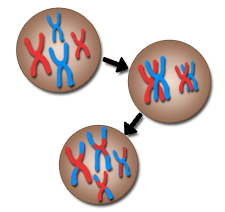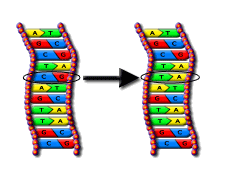Archival Notice
This is an archive page that is no longer being updated. It may contain outdated information and links may no longer function as originally intended.
Home | Glossary | Resources | Help | Contact Us | Course Map
The ultimate source of evolution is mutation, a permanent, heritable change in the nucleotide sequence of a chromosome, usually in a single gene. Mutations occur at random and can vary in their effect. They may be neutral with no phenotypic expression, or cause variations to an individual's phenotype, which may range from small-scale to large-scale. Although mutations can affect an individual's survival, evolution is driven forward only if this mutation can be passed on to the next generation, thereby affecting that generation's survival rates as well.
Recombination is another source of variation in a population. It is a process whereby two homologous chromosomes exchange some of their genetic material producing two chromosomes that are genetically unique from the original, or parental, chromosomes. Recombination enlarges the amount of genetic diversity in the population by increasing the number of alleles at any given genetic locus.08
Both mutations and recombination can alter the allelic frequencies from generation to generation and, at least in theory in small populations, can affect HWE. While mutation and recombination add to the variation within a population, their effects are limited.
Additional Online Courses
- What Every First Responding Officer Should Know About DNA Evidence
- Collecting DNA Evidence at Property Crime Scenes
- DNA – A Prosecutor’s Practice Notebook
- Crime Scene and DNA Basics
- Laboratory Safety Programs
- DNA Amplification
- Population Genetics and Statistics
- Non-STR DNA Markers: SNPs, Y-STRs, LCN and mtDNA
- Firearms Examiner Training
- Forensic DNA Education for Law Enforcement Decisionmakers
- What Every Investigator and Evidence Technician Should Know About DNA Evidence
- Principles of Forensic DNA for Officers of the Court
- Law 101: Legal Guide for the Forensic Expert
- Laboratory Orientation and Testing of Body Fluids and Tissues
- DNA Extraction and Quantitation
- STR Data Analysis and Interpretation
- Communication Skills, Report Writing, and Courtroom Testimony
- Español for Law Enforcement
- Amplified DNA Product Separation for Forensic Analysts



